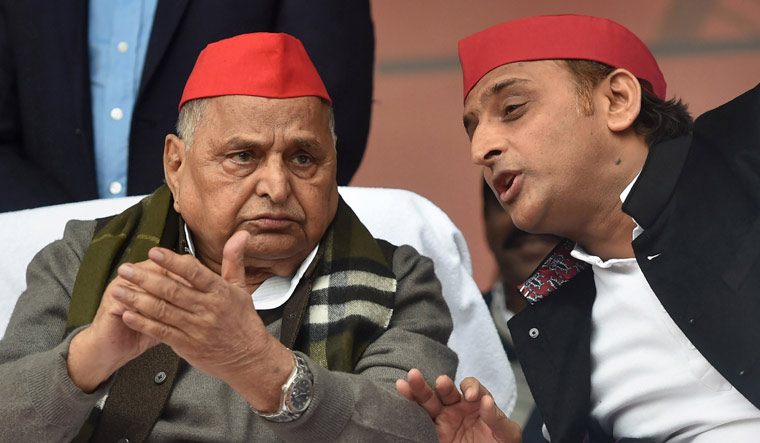An analysis of the affidavits by the Association for Democratic Reforms (ADR) of the candidates in fray for the seven assembly seats in which bypolls will be held on November 3 reveals that the Samajwadi Party (SP) has fielded the most number of candidates with criminal cases. In contrast, the state’s ruling Bharatiya Janata Party (BJP) has not fielded a single candidate with a criminal case.
The ADR has analysed the self-sworn affidavits of 87 out of 88 candidates. One candidate has been left out due to incomplete papers and improperly scanned affidavit.
Overall, more than one in five candidates (21 per cent) have criminal cases registered against them. Of these 17 per cent are cases of serious nature. Such cases include those with a punishment of five years or more, non-bailable offence, charges related to assault, murder, rape, kidnapping; electoral malpractice, etc.
The SP leads this list with 83 per cent of the candidates fielded by the party having admitted to criminal cases. Each of these candidates has cases which fall in a serious category. The BSP is second on the list with 71 per cent of its candidates having criminal cases to their names—and each one of these is of a serious nature. The Congress has fielded 17 per cent candidates with cases against them, but none of these are of serious nature. The BJP has not fielded a single candidate with a criminal case to his name, while 19 per cent of the independent candidates also have criminal cases registered against them.
In this list of the inglorious, one candidate is charged with rape, one with murder and four with attempt to murder.
There are two constituencies in which three or more of the contesting candidates have declared criminal cases against themselves.
The high number of criminally tainted candidates, as per the ADR analysis, shows that the directions of the Supreme Court have had no effect on the political parties in selection of candidates as they have again followed their old practice of giving tickets to around 21 per cent candidates with criminal cases.
The SC had, on February 13, specifically instructed political parties to give reasons for such selection and why other individuals without criminal antecedents could not be selected as candidates. “As per these mandatory guidelines, the reasons for such selection has to be with reference to qualifications, achievements and merit of the candidate concerned. Therefore, such unfounded and baseless reasons given by political parties like popularity of the person, does good social work, cases are politically motivated, etc are not sound and cogent reasons for fielding candidates with tainted backgrounds. This data clearly shows that political parties have no interest in reforming the electoral system and our democracy will continue to suffer at the hands of lawbreakers who become lawmakers”, reads the ADR report.
The highest number of candidates—24 per cent—have assets between Rs 10-50 lakhs and Rs 50 lakhs to a crore. Only 20 candidates (23 per cent) have assets less than Rs 10 lakhs while 15 candidates (17 per cent) have assets valued at more than Rs 5 crores. Every candidate fielded by the BSP is a crorepati. This is followed by SP, INC, BJP and independent candidates.
The richest candidate is the one fielded by the SP in Deoria with assets worth Rs 31 crore plus, while a candidate with zero assets has been fielded in Bulandshahr by the Rashtriya Jankranti Party.
The most widely reported educational qualification is graduation and above while one candidate is illiterate. The highest number of candidates fall in the 41 to 60 years age group while only 10 per cent of the candidates are females.
Almost two in five candidates (39 per cent) has assets of at least a crore rupees while the average size of assets of the candidates is Rs 2.91 crores.
The ADR has made a number of suggestions to remedy the existing problem of criminalisation of politics. These include: reprimand to political parties and politicians for their complete lack of will, reprehensible predilection and absence of required laws; permanent disqualification of candidates convicted for heinous crimes like murder, rape, smuggling, dacoity, kidnapping, etc; disqualification of persons from contesting elections to the public offices against whom charges have been framed for having committed serious criminal offences punishable by imprisonment of at least 5 years, and the case is filed at least 6 months prior to the election in question; cancellation of tax exemptions given to the political parties who field such tainted candidates; bringing political parties under the Right to Information Act; de-registration and de-recognition of political parties that knowingly put up a candidate with a tainted background, etc.
The association has also called for the implementation of the SC judgement on NOTA ‘in letter and spirit’. The analysis says, “…if NOTA gets more votes than any of the candidates, none of the candidates should be declared elected, and a fresh election should be held) in the fresh election, none of the candidates in the earlier election, in which NOTA got the highest number of votes, should be allowed to contest”.







